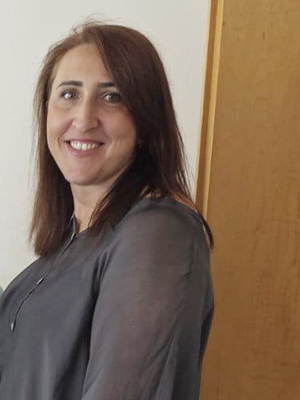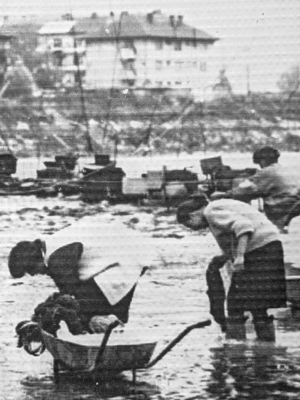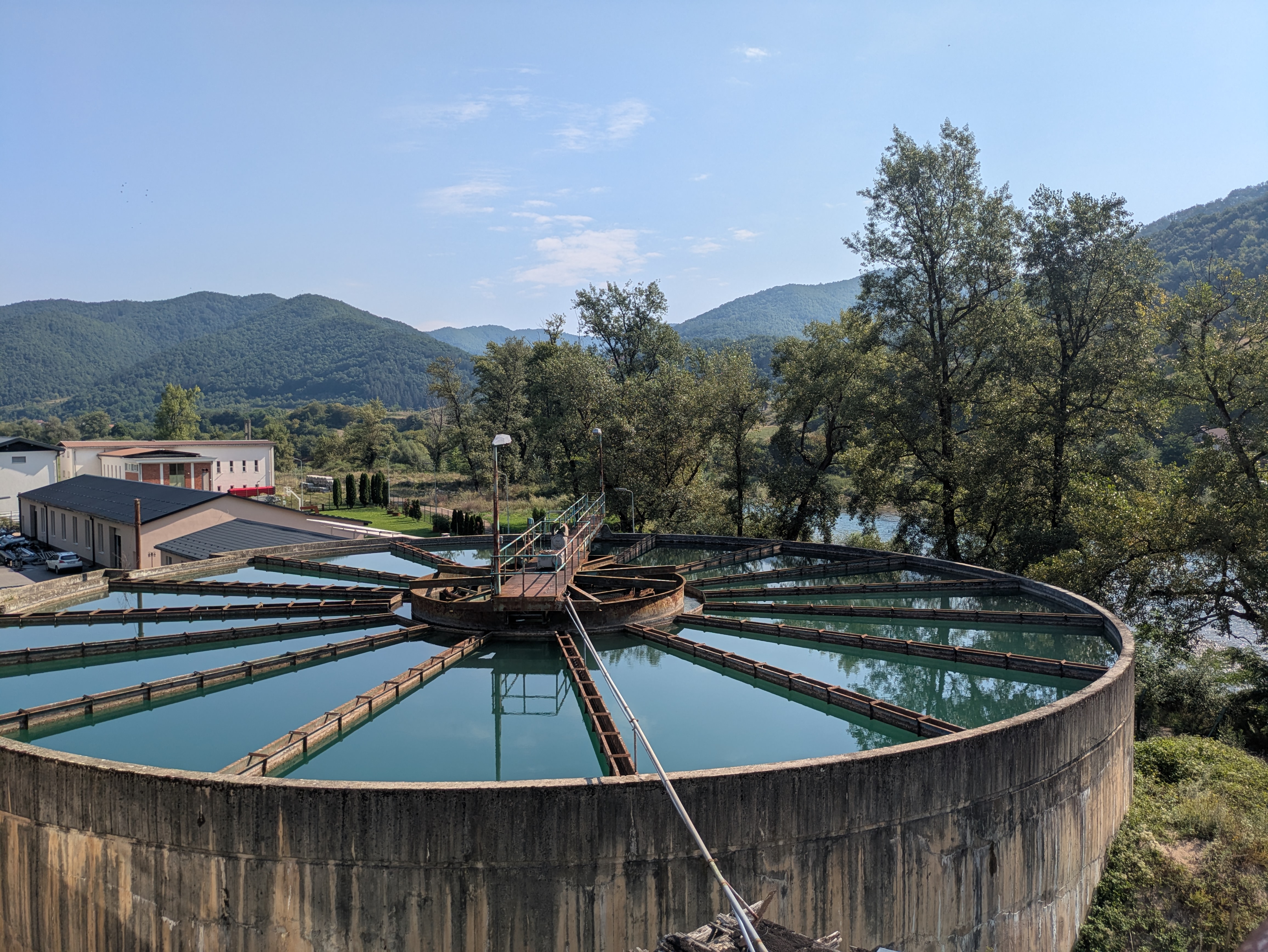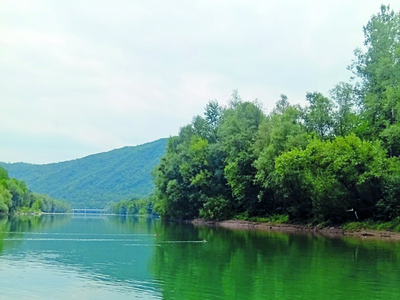Water, electricity and resilience: a municipal company in transition.
Goražde is committed to change, with a young director at the helm who has a clear vision. Senada Mirvić, who wants to guide the long-established utility company ‘6. Mart into a modern, climate-friendly enterprise. Rather than accepting outdated technology and high electricity costs, she is focusing on solutions such as solar power for the waterworks, more efficient systems and greater local independence. For them, renewable energies are not just a symbol, but a tool for building a resilient city once again.
Ms Mirvić, Goražde is one of eight cities taking part in our Energy Transition Partnership project, which is funded by the Federal Foreign Office. As part of this project, I had the wonderful opportunity to visit you in August with the delegation from Greifswald, our partner city. You took up the position of director of the public utility company ‘6 Mart’ in winter 2024. '6 Mart' is a date. What does it refer to?
 March 6, 1945, marks the date of Goražde’s liberation during World War II, and the company was founded in 1958 as an enterprise for providing communal / utility services to the population. The main water supply system was built in the 1950s, and the sewage system in the 1970s. These two activities formed the basis for the establishment of the company. Over time, the company expanded to include other communal services, such as waste collection, maintenance and landscaping of green areas, and similar activities.
March 6, 1945, marks the date of Goražde’s liberation during World War II, and the company was founded in 1958 as an enterprise for providing communal / utility services to the population. The main water supply system was built in the 1950s, and the sewage system in the 1970s. These two activities formed the basis for the establishment of the company. Over time, the company expanded to include other communal services, such as waste collection, maintenance and landscaping of green areas, and similar activities.
The main water supply was built in the 1950s, and the sewage system in the 1970s. Those two activities were the basis for establishing this company. Over time, the company also acquired other communal activities, such as garbage collection, landscaping and maintenance of green areas, and the like.
Before taking on your new role as director, you worked at 6 Mart for over eight years. How did this prepare you for this demanding position?
During my time working at this public utility company, I have been involved in several areas, which allowed me to become familiar with the existing challenges. Taking on the role of director was a great challenge, especially as a young woman at the very beginning of my career. However, with the support of my employees, we have been addressing the issues within our capacities, and of course, with the assistance of our founder — the City of Goražde.
As a manager, how would you like to make an important contribution to public service and city organisation?
Since the City of Goražde established this company to handle communal services, our main function is to meet the needs and requests of our fellow citizens: ensuring regular water supply, maintaining a proper sewage network, providing regular waste collection, taking care of green areas, and performing unplanned tasks as needed. Through my efforts, I strive to improve the company’s financial situation in order to create better working conditions and provide higher salaries for our employees.
Is that the biggest challenge?
The company’s biggest challenge still remains the lack of qualified personnel. Considering the nature of our work, it is also necessary to modernize our machinery, equipment, and vehicle fleet, which would greatly facilitate the work of our employees. Due to insufficient financial resources, we are not able to hire new staff, even though they are greatly needed — from the Water Factory to city maintenance operations.
The Drina River played an important role in the Bosnian War, as it also supplies water. What role did it play?
 During the war, Goražde had no access to a secure water supply, as before the war the water came from the neighboring town of Čajniče (Republic of Srpska). The local population managed by using nearby springs, while for larger needs they relied on the Drina River (for washing clothes, toilets, etc.). There was also no electricity. A group of citizens, guided by the experience of a car mechanic and several engineers, designed small hydroelectric plants that were submerged in the Drina River, providing a minimum amount of electricity for the hospital, radio transmitters, and other essential services during that wartime period.
During the war, Goražde had no access to a secure water supply, as before the war the water came from the neighboring town of Čajniče (Republic of Srpska). The local population managed by using nearby springs, while for larger needs they relied on the Drina River (for washing clothes, toilets, etc.). There was also no electricity. A group of citizens, guided by the experience of a car mechanic and several engineers, designed small hydroelectric plants that were submerged in the Drina River, providing a minimum amount of electricity for the hospital, radio transmitters, and other essential services during that wartime period.
In addition to being the jewel of our city, the Drina River also serves as the source of our city’s water supply. We use a water intake facility in Vitkovići, where the Water Factory Plant is located, providing water for the entire city. The water supply system was built in 1998 on the existing site of the former “AZOT” industrial complex and its technical water plant. At that time, the existing pumps — originally manufactured around 1950 — were also put to use.
In what condition is the company if we take a look at the water factory?
 The post-war events and the privatization of public property have led to a number of issues concerning the Water Factory facility itself. Currently, the facility is owned by the Government of the Bosnian-Podrinje Canton Goražde, while it is managed by the Public Utility Company “6th March” Goražde, whose founder is the City of Goražde. Due to this complex system, it is the citizens who suffer the most. We hope that this issue will also be resolved in the future.
The post-war events and the privatization of public property have led to a number of issues concerning the Water Factory facility itself. Currently, the facility is owned by the Government of the Bosnian-Podrinje Canton Goražde, while it is managed by the Public Utility Company “6th March” Goražde, whose founder is the City of Goražde. Due to this complex system, it is the citizens who suffer the most. We hope that this issue will also be resolved in the future.
The facility itself is in very poor condition, especially the roof, which was damaged during a strong windstorm four years ago. I hope that both the owners and the founders will secure the necessary funds to repair this part of the building.
During our visit, you told us that the water factory needs a lot of electricity because of the outdated pumps. Could you tell us how much electricity the factory would need to be profitable?
As previously mentioned, the pumps currently in use date back to 1950, and spare parts for them are no longer available. Replacing these pumps would likely reduce electricity costs as well. At present, the company’s monthly electricity bills amount to approximately €30,000.
Have you considered using renewable energies for the company, and what would be needed to switch to them? What are the main obstacles?
Yes, we would like to install solar panels on the roof of our facility, which would significantly reduce electricity bills and, consequently, lower water distribution costs. However, the preparation of project documentation and the installation of the panels represent expenses that this public utility company cannot finance on its own. Editor's note: If anyone sees an opportunities to support: Feel free contact us.
How would you describe the role that renewables could play in times of war and post-crisis?
Our experiences from the war period have shown that in any conflict, the population is first deprived of water and electricity, which also cuts off the flow of information. Renewable energy sources are the only solution for any local community to avoid complete blockades during wartime period. By building small hydroelectric plants on the Drina River, Goražde was once again connected to the rest of the world, which greatly eased the lives of its residents.
Contact:
Anika Schwalbe
Project Manager: Energy Transition Town Twinnings
a.schwalbe@unendlich-viel-energie.de



Social Media